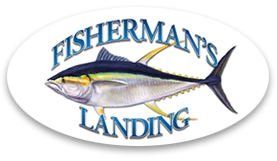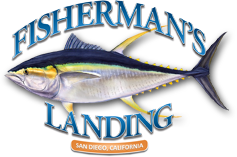Fish Report for 11-4-2005
Royal Star Fish Report
11-4-2005
Royal Star
We had a nice leisurely day of traveling down the line talking and rigging in preparation for the fishing phase of our voyage beginning tomorrow. After circulating around the boat yesterday as well as the previous voyage, I have to jump up on my soapbox and address a recent trend that appears to be more and more prevalent.
We have been faced with a fair number of anglers who arrive with mounds of equipment all rigged up and ready to go on the advice of various individuals who have been long range fishing for giant yellowfin in the past and landed fish in the two and even three hundred pound size class. To begin with, I think it is fantastic that the anglers dispensing advice are so generous to offer their time and enthusiasm, but I caution all to keep the present fishing, the present dynamics, in mind when preparing for your voyage. What we have been encountering is a number of anglers rigged up for situations in the past that although were appropriate then, are not ideal for now.
With this in mind I wish to offer the best advice to all anglers venturing a long range voyage. Call the office of your chosen long range vessel and ask to speak with one of the operators or crewmen regarding tackle rigging specifics for your voyage. In most cases all of our operations have a highly qualified individual to provide such information through a return phone call. I would even venture that most long range offices would be happy to reference such a request directly to the boat if someone was not available shore side to answer your questions. By referring your inquiries directly to the vessel you will be fishing with, anglers can avoid the situation we have experienced several times during the past three weeks that goes something like this.
Crewman: " Hi sir, I see you are rigging with a ten foot fluorocarbon topshot connected directly to your spectra."
Angler: " Yep so and so (prominent long range big tuna angler) told me this is the only way to go, he caught all of his fish like this two years ago on his successful voyage."
Crewman: " Well that sounds great but you really don't need that rig as the fish have been readily accepting one hundred to one hundred thirty pound monofilament. Also, I'm sorry to say that those type rigs will likely cost you fish in this scenario as there is zero shock absorption. The percentage of hook pulls and break off's are terrible when using such outfits."
Angler (now either hugely disappointed or fuming): " But so and so told me this is the way to go, I rigged twenty ten foot top shots of varying line sizes, it took me six hours in my garage, I've put a hundred fifty bucks in these rigs just for this trip."
Crewman (now uncomfortable but steadfast as he knows the Captain will be mighty upset if a big fish is lost due to such rigging): " Well I hate to say it but we are going to have to get you set up differently for this trip to stack the odds as high as possible in your favor while pulling on one of these big fish."
Angler: " Well o.k., let's do what we have to do to make it right."
Of course this fictional scenario does not represent all cases, but it makes the point. The best source for fishing information on your upcoming long range voyage is the boat you are scheduled with. This is not to say that you can't get good advice from experienced long range anglers and tackle stores, you can, but leave the specific rigging details to the guys on the boats who are on the water hundreds of days per year in a professional capacity.
That said, we will arrive at our first destination this morning with plans to shake the kinks out, get familiar with the routine, and comfortable with each other at the rail before continuing down the line towards big fish country. With any luck we will start the trip on a good note with a few fish in the tank at day's end.
We have been faced with a fair number of anglers who arrive with mounds of equipment all rigged up and ready to go on the advice of various individuals who have been long range fishing for giant yellowfin in the past and landed fish in the two and even three hundred pound size class. To begin with, I think it is fantastic that the anglers dispensing advice are so generous to offer their time and enthusiasm, but I caution all to keep the present fishing, the present dynamics, in mind when preparing for your voyage. What we have been encountering is a number of anglers rigged up for situations in the past that although were appropriate then, are not ideal for now.
With this in mind I wish to offer the best advice to all anglers venturing a long range voyage. Call the office of your chosen long range vessel and ask to speak with one of the operators or crewmen regarding tackle rigging specifics for your voyage. In most cases all of our operations have a highly qualified individual to provide such information through a return phone call. I would even venture that most long range offices would be happy to reference such a request directly to the boat if someone was not available shore side to answer your questions. By referring your inquiries directly to the vessel you will be fishing with, anglers can avoid the situation we have experienced several times during the past three weeks that goes something like this.
Crewman: " Hi sir, I see you are rigging with a ten foot fluorocarbon topshot connected directly to your spectra."
Angler: " Yep so and so (prominent long range big tuna angler) told me this is the only way to go, he caught all of his fish like this two years ago on his successful voyage."
Crewman: " Well that sounds great but you really don't need that rig as the fish have been readily accepting one hundred to one hundred thirty pound monofilament. Also, I'm sorry to say that those type rigs will likely cost you fish in this scenario as there is zero shock absorption. The percentage of hook pulls and break off's are terrible when using such outfits."
Angler (now either hugely disappointed or fuming): " But so and so told me this is the way to go, I rigged twenty ten foot top shots of varying line sizes, it took me six hours in my garage, I've put a hundred fifty bucks in these rigs just for this trip."
Crewman (now uncomfortable but steadfast as he knows the Captain will be mighty upset if a big fish is lost due to such rigging): " Well I hate to say it but we are going to have to get you set up differently for this trip to stack the odds as high as possible in your favor while pulling on one of these big fish."
Angler: " Well o.k., let's do what we have to do to make it right."
Of course this fictional scenario does not represent all cases, but it makes the point. The best source for fishing information on your upcoming long range voyage is the boat you are scheduled with. This is not to say that you can't get good advice from experienced long range anglers and tackle stores, you can, but leave the specific rigging details to the guys on the boats who are on the water hundreds of days per year in a professional capacity.
That said, we will arrive at our first destination this morning with plans to shake the kinks out, get familiar with the routine, and comfortable with each other at the rail before continuing down the line towards big fish country. With any luck we will start the trip on a good note with a few fish in the tank at day's end.






